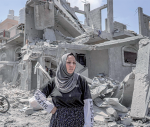You are here
Reshaping the fight against tobacco in Jordan
Jun 19,2019 - Last updated at Jun 19,2019
At last, the National Anti-Smoking Committee was convened by Prime Minister Omar Razzaz on Monday for the first time ever, even though the smoking epidemic in the country has reached an alarming rate, especially among the youth.
What could have stirred this overdue concern was the disclosure by the World Health Organisation (WHO) that Jordan is among the worst countries in the world when it comes to smoking.
Over 70 per cent of adult Jordanian males are smokers, according to the WHO, and spend about JD1.6 billion on tobacco products annually. This huge amount equals 6 per cent of the country's GDP! To treat people afflicted by smoking-related illnesses, Jordan spends JD200 million annually! Worse still, health officials revealed that about 9,000 Jordanians die every year from smoking-related causes.
It is now well established beyond a shadow of a doubt that a number of diseases are directly linked to smoking, including cancer, heart attacks and diabetes.
Of course, this revelation is not really new.The country has been well aware of the scourge of smoking but was unable to do much about it for lack of sustained will.
National stakeholders have often sounded the alarm about the dangers of smoking, but few people were listening. The country has the habit of reacting to such shocking news by adopting the stringiest measures possible against smoking in public places, only to see these efforts fizzle out gradually for lack of sustained support and formidable opposition by certain public places, like cafes and restaurants, which have fought tooth and nail against banning smoking at their facilities.
Now it seems Prime Minister Razzaz himself is taking the bull by the horns by convening an urgent meeting of the National Anti-Smoking Committee, and ordering the adoption of immediate measures to deal with the worsening crisis.
Come to think of it, the problem of smoking and its dire effects on health go beyond smokers, as secondary smoking could be just as bad, especially among unsuspecting people like children.
There is no need to reiterate the health and human cost of smoking, not to mention the huge economic bill related to smoking, which runs into millions and millions of Jordanian dinars.
For the country, which faces formidable economic and financial crises, incurring expenses in the hundreds of millions of dinars on smoking is highly irresponsible and reckless.
Perhaps this time the government will begin to take more seriously the threats and untold dangers of smoking by enforcing in earnest existing rules and regulations against it, and then adopting additional legislation to strengthen what has already been adopted on paper.













